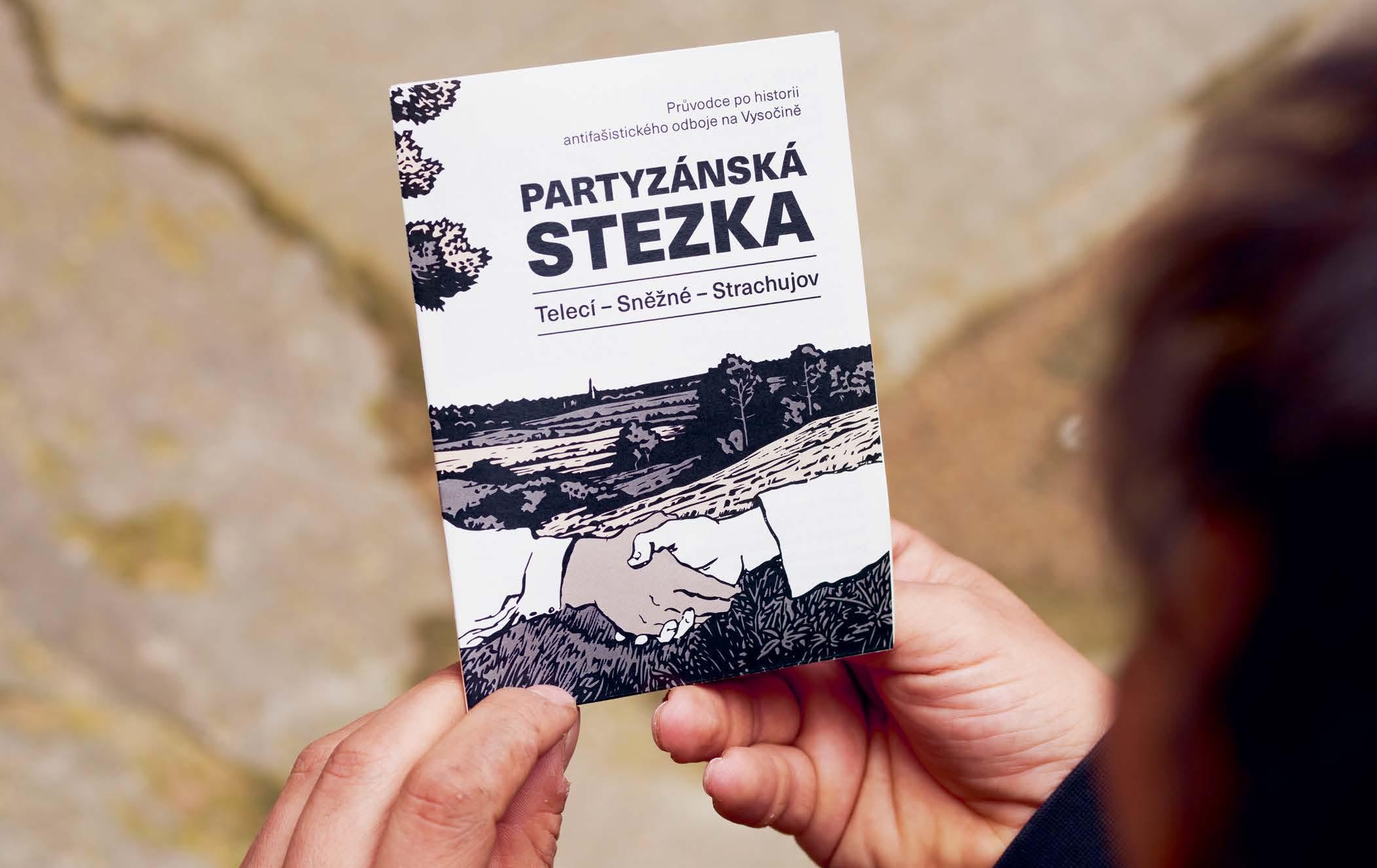
3 minute read
Martin Pfann
Martin Pfann (* 1990) se ve své diplomové práci Beze stopy (2023) vztahuje k odkazu antifašistického odboje na Vysočině. Jeho výchozím médiem se stává samotná krajina, kterou rozpoznává jako svébytné úložiště či nosič paměti. Uchyluje se přitom k celé řadě nástrojů, jejichž pomocí sestavuje jakousi alternativní kartografii. Svou vzpomínkovou stezku po stopách pozapomenutého romského partyzána Josefa Serinka, Františka Hyšky a dalších znovuobjevených dohledatelných i anonymních postav z řad místního obyvatelstva zachycuje domapy a doprovází audioprůvodcem. Své objevy i své zásahy do krajiny navíc dokumentuje na YouTube a na Instagramu. Další sociální síť potom splétá přímo v terénu, když zve své známé ke společnému kopání památeční zemljanky a když se setkává s místním obyvatelstvem i se zástupci*zástupkyněmi institucí, které by mohly zaštítit kodifikaci oficiální turistické trasy. Vzpomínání na antifašistický odboj bylo selektivní a tendenční před rokem 1989 i po něm. Ani Pfann nenabízí objektivní přístup. Zato předkládá takovou selekci a takové tendence, které mají napomoct vědomému utváření určité „představy společenství“. Nestopuje přitom jen kolektivní paměť odboje, ale i osobní vzpomínky na dětství, které na Vysočině strávil. Oklikou tak nachází cestu k protestantskému prostředí, v němž vyrůstal a jež o půlstoletí dřív poskytovalo důležité podloží protinacistickému vzdoru.
V dalším plánu Pfannova partyzánská stezka představuje dosavadní vyústění jeho nejen umělecké dráhy. Sám své někdejší studium romistiky popisuje jako návod, jak vzít vážně zkušenost „těch druhých“ a jak se orientovat v teritoriu mezi pamětí a historií. Podobně v řadě odboček navazuje na svoje starší práce, jejichž pozadí tvoří řada kolektivních počinů více méně aktivistické povahy. Údernickou svépomocnou osvětu rozvíjel už v podobě památníku-přednášky na počest odbojářky Marie Sedláčkové (Marie Sedláčková Memorial, 2019). Jeho diplomový projekt Without a trace (2023) by se ale dal spojit s dalšími pracemi, v nichž se s performativní nadsázkou vymezoval vůči jistým politickým polohám (Right Angle Yoga, 2022) nebo testoval nepohodlnost chlapáckých a národoveckých stereotypů (Pride, 2018). Tentokrát však míří k jinému vyznění, když usiluje o pozitivní identifikaci, a dokonce i o přijetí určitého patosu. Přestože se Pfannova diplomová trasa opírá o LARP jako mobilizační strategii a politiku identit pojímá jako svého druhu RPG, poukazuje nakonec k východisku jak zmelancholie radikální levice, tak z cynismu současného umění.
Martin Pfann je absolventem Ateliéru environmentu FaVU VUT v Brně pod vedením Barbory Klímové a Matěje Smetany.
Vojtěch Märc
Martin Pfann (* 1990) deals with the legacy of the anti-fascist resistance in the Vysočina region in his diploma thesis Without a Trace (2023). His starting medium is the landscape itself, which he approaches with a variety of tools in order to construct a form of alternative cartography. His memorial trail—captured on a map and accompanied by an audio guide—is in the footsteps of the forgotten Romani partisan Josef Serinek, František Hyška and other rediscovered, traceable and anonymous figures from the local population. He also documents his discoveries and his interventions in the landscape on YouTube and Instagram. He then weaves another social network directly in the terrain, when he invites his friends to dig together at the memorial earthworks and when he meets with local residents and representatives of institutions that could sponsor the codification of an official tourist route.
Remembrance of the anti-fascist resistance was selective and biased before 1989, and it has remained so even after that time. Nor does Pfann offer an objective approach. Instead, he presents such a selection in a way that is intended to help the conscious formation of a certain “idea of community”. In doing so, he is not only tracing the collective memory of the resistance, but also personal memories from his childhood spent in the Vysočina region. In a roundabout way he finds himself back in the Protestant environment in which he grew up and which, half a century earlier, had provided an important base for anti-Nazi resistance.
In another plan, Pfann’s partisan trail does not represent the culmination of his artistic career. He describes his former Romani studies as being a guide to taking seriously the experiences of “the others”, and how to navigate in the territory between memory and history. Similarly, in a series of digressions, he builds on his earlier works, the backdrop of which is a series of collective undertakings of a more or less activist nature. He has already developed a self-help education in the form of a memorial-lecture in honour of the resistance fighter Marie Sedláčková. His diploma project could be linked to other works in which he defined himself with performative hyperbole against certain political positions (Right Angle Yoga, 2022) and tested the non-comfortability of masculine and nationalist stereotypes (Pride, 2018). This time, however, he aims for a different tone, namely a positive identification and even an acceptance of a certain pathos. Although Pfann’s diploma route relies on LARP as a mobilisation strategy and he conceives identity politics as a kind of RPG, this ultimately points to a way out of both the melancholy of the radical left and the cynicism of contemporary art. Martin Pfann is a graduate of the Environment Studio at the FFA BUT under the guidance of Barbora Klímová and Matěj Smetana.












